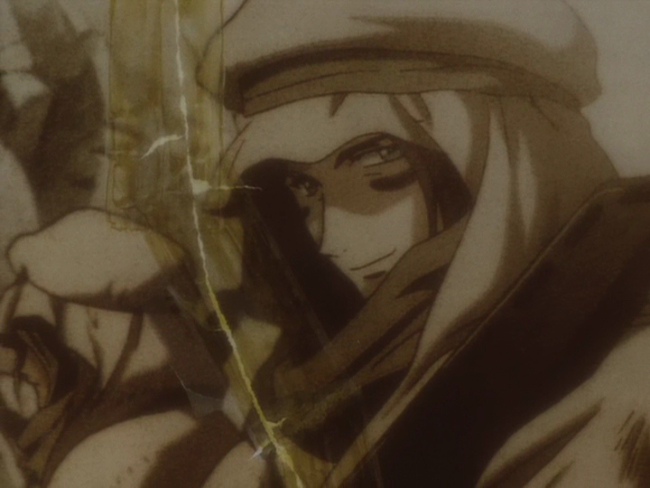
A shift occurs halfway through Cowboy Bebop with its first two part episode. The show that had mainly been about strange and new configurations and combinations becomes about the search for a past and for stability. It's a beautiful, sad, and kind of sleepy story in which the main characters begin to become aware of things that are precious to them.

Sessions Twelve and Thirteen: Jupiter Jazz
There's a very appropriately purgatorial quality to these episodes: purgatorial in terms of compulsory waiting and in terms of being caught between two states of being. In one sense, it's typical of the kinds of stories that we've seen so far. Where "Stray Dog Strut", "Gateway Shuffle", and "Heavy Metal Queen" had explored blurred or complicated lines of race, species, and gender, respectively, in the foreground of "Jupiter Jazz" is a story about sex and gender. Most of the action takes place in a town on Jupiter's moon Callisto where, for reasons left unexplained, there are no women.
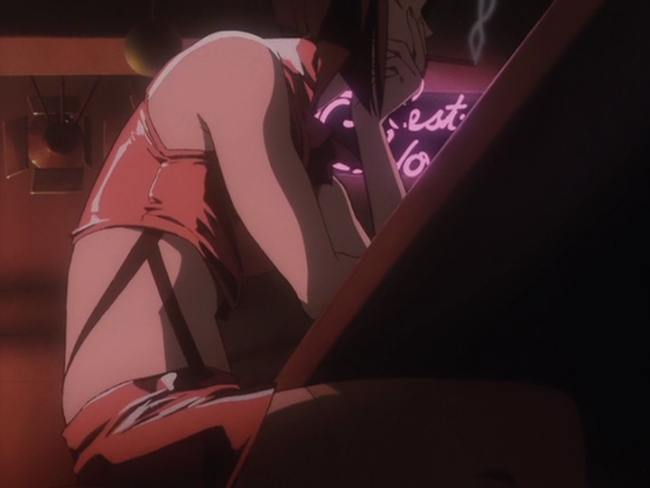
Not that this bothers Faye (Megumi Hayashibara), though she seems to only become aware of this fact when informed after she's apparently already been drinking for some time at a dive bar. The camera crawls slowly up her body where she sits on the stool, still wearing her yellow rubber bondage outfit despite the fact that it's snowing outside. As in her fan service shots in "Ganymede Elegy", the effect of lingering shots of Faye sleepily relaxed give a sense of physical intimacy, like the viewer is lying in bed with her. But the exploitation here is not merely to titillate the viewer and the titillation in itself serves the ideas operating in the episode. The point of view on her, the Gaze, if you must, is also the point of view of the guys in the bar and it makes us more aware of the danger she's in. It also adds an element to the trust issues Faye is confronting in this story.

The exploitation here invites us to think about how it reflects Faye's self-image and how her appearance influences the people around her. As established previously, she's happy to use her looks to manipulate people, but is this entirely an advantage for her or does it also reflect a damaging preoccupation? As she mentioned in the previous episode, she believes nothing good's ever happened to her when she's trusted someone, so in this episode she's absconded with the contents of the Bebop safe. But she expands on her motives when asked to explain. To have comrades means she "worries about things I don't have to." She adds with a touch of bitterness, "Because I'm such a good woman," as though she doesn't believe it, "all the guys end up fighting for me." But she doesn't sound like she believes that, either, despite the fact that Gren (Kenyu Horiuchi) had just fought off a bunch of guys to protect her.

The scene had begun with Faye calmly putting on her gloves, expressing an eagerness to work off her aggression by fighting off a bunch of guys who confronted her in an alley. It's like the premise Joss Whedon conceived for Buffy the Vampire Slayer of the apparently vulnerable young woman cornered in an alley by monsters but instead of the standard plot where a dashing gentleman comes in and rescues her she beats up the vamps herself. But Gren intercedes to save her despite the fact that she doesn't need it and despite the fact that, since he's gay, he doesn't have usual ulterior motive for saving a damsel in distress. On several levels, the scene is a pantomime; the actions, which tradition suggest should have great meaning, are almost meaningless. But this is a story about finding depth of meaning behind re-contextualised surface.
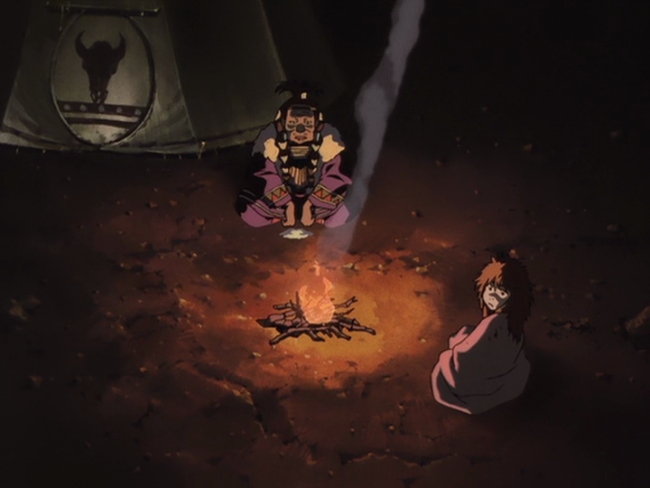
The first and last scenes of the episode are of two people who seem to be Native Americans in traditional dress; an old man, Laughing Bull (Takehiro Koyama), and a young boy. But they're not in the American south west, as it appears, but somewhere on Mars and whether or not these two have any affiliation with any real Native American tribe is unclear. But Bull speaks of a soul who died without managing to have faith in the "Great Spirit". This statement, which implies the Great Spirit's obvious existence, is ironic in that it comes from an environment where one can almost never rely on a traditional interpretation of the surface. But as the story makes clear, some kind of faith is a fundamental human need.
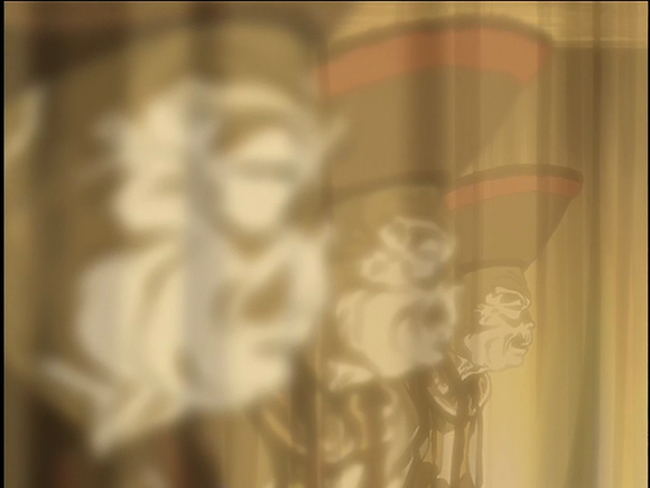
The thematic tables have turned in the portions of the story dealing with Spike (Koichi Yamadera) and Vicious (Norio Wakamoto). In "Ballad of the Fallen Angels", it seemed Spike was the betrayer who had been exiled from Heaven, i.e. the Syndicate, and Vicious had labelled him a "beast" for his outsider status. Now we have the first sign that Vicious is going to be a far more authentic betrayer as one of the heads of the Syndicate calls him a snake and then cautions him, "A snake cannot eat a dragon." This is followed by Vicious' discussion with his new subordinate, Lin (Hikaru Midorikawa), in which Vicious coolly tells the young man that, in order to succeed in this life, he must betray him at some point. Vicious' detachment and self-confidence are so complete that he's able to advise someone to betray him, this lack of sentimentality being the source of his strength. But in the second episode's climax, an amazing dogfight of hand drawn animation, we get a hint that there are some flaws in Vicious' detachment when a bomb rigged by Gren is triggered by a music box hidden in Vicious' ship.
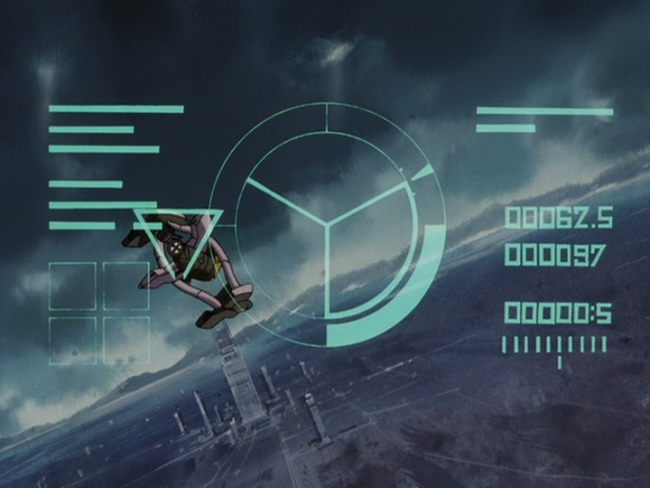
Remember Spike rebuked Faye for being "tone deaf" in "Ballad of the Fallen Angels"--music continues to have importance and seems to carry an almost spiritual weight. "Jupiter Jazz" revolves around a song Vicious calls "Julia" ("Jupiter","Jazz","Julia", three Js) when Gren asks him for the name after hearing it played on that fateful music box. Whether "Julia" is the name of the song or if Vicious is just voicing its association for him with the character Julia is unclear. Julia, the love of Spike's life, and possibly someone Vicious cares for too, is again, like a Great Spirit, a powerful influence in a story where she has no apparent physical presence. But when Faye meets Gren in the bar, we see Gren has made good on his promise to Vicious all those years ago to play the song on his saxophone.

Faye tells Gren the concept of a "comrade" only fills her with disgust--given her trust issues, that's no surprise--while Gren says there's nothing more important to him. Throughout the two episodes, Gren reminisces on the camaraderie between himself and other soldiers he'd served with years ago on Titan in some conflict we don't learn the details of. Despite the fact that Vicious framed him as a spy, Gren still feels a connexion to the other man, perhaps love.
Of course, the most obvious instance of altered signifiers in this episode, if not the whole series, is the revelation that Gren is physically a cross between male and female.
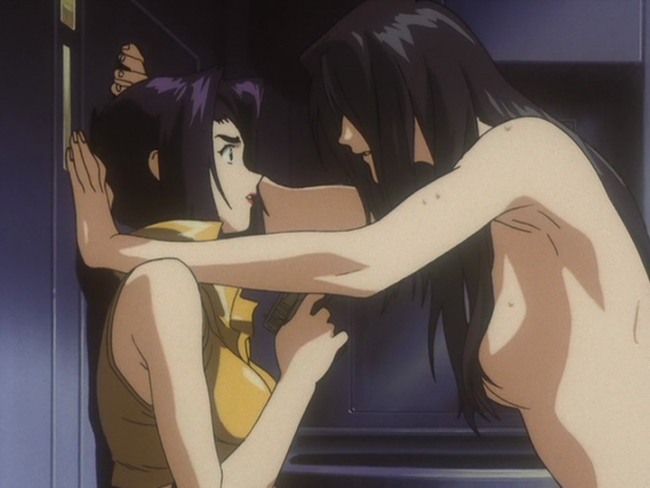
"I am both, but I am neither," he tells Faye. The scene where she confronts him with a pistol at the end of the first episode is intercut with a showdown between Spike and Vicious where we learn Lin was once Spike's subordinate. Spike is shot with a tranquilliser dart and left lying on the ground, another case where a character's stasis is accompanied by visuals that grant us a sense of physical intimacy with the character, in this case aided by a crow sitting on Spike's chest when he wakes up, which also associates the moment with death.

At the end of the second episode, Gren asks Spike about his two different coloured eyes and Spike says one eye always sees the past and doesn't explain what the other sees. Gren and Spike are both caught between two different realities, two different identities, and both refer to ways in which they were physically altered against their will, Gren's hormonal balance having been altered by treatment in prison for the crime Vicious framed him for. And both Gren and Spike are in purgatory--they weren't changed into something else, they were changed into a state defined by having no fixed definition.

The episode has two book ends--Laughing Bull comes at the very end and the very beginning, but just after the beginning and just before the end we also have a moment with Jet, whose voice actor, Unsho Ishizuka, passed away on the thirteenth of this month. We see him standing still and smoking in almost exactly the same pose from two different angles. We have a sense of the stability that Jet represents and it becomes a point of gender commentary in the preview between the two episodes which normally consists of the main cast apparently bantering off-script. We hear Spike pondering the pronounced feminine sides some people have--"Are you talking about me?!" Faye asks incredulously--but of course he means Jet. The two episodes characterise Jet's caretaker instincts as feminine, ironic after the obvious interpretation in "Ganymede Elegy" was of him as a traditional patriarch.
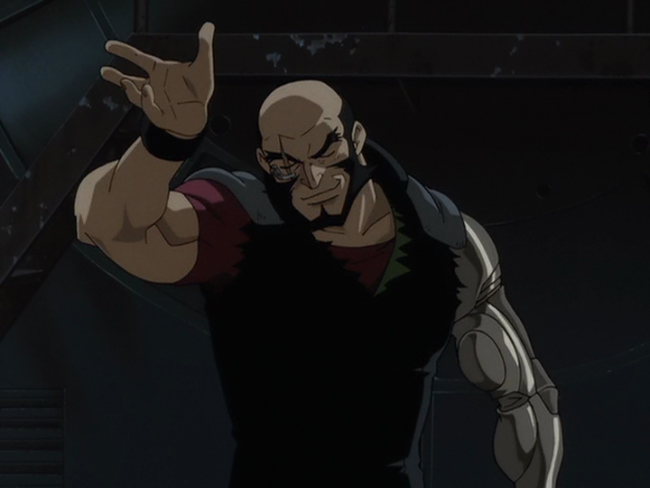
As Spike leaves at the beginning of the first half of "Jupiter Jazz", there's an oddly elaborately animated moment focusing on Jet telling Spike that he doesn't care if he doesn't come back and he's only looking for Faye because of the money she stole. To insult Spike's disloyalty, Jet says, "Now I understand!" while Spike says, more quietly so that Jet doesn't hear, "I understand too." Despite the bluster and threats, it's clear Jet will always take back the members of his adopted family and he's happy to have them under his roof. He presents a surface that doesn't reflect the love he truly feels; here is an instance where the false surface is over a deeper meaning or loyalty. This is a point where Jet and Faye are connected--she, too, presents a surface personality that demands distance but needs comrades. As Gren tells her, her actions were truly prompted by the fact that she had come to fear the pain of losing the people she'd in reality come to care for.
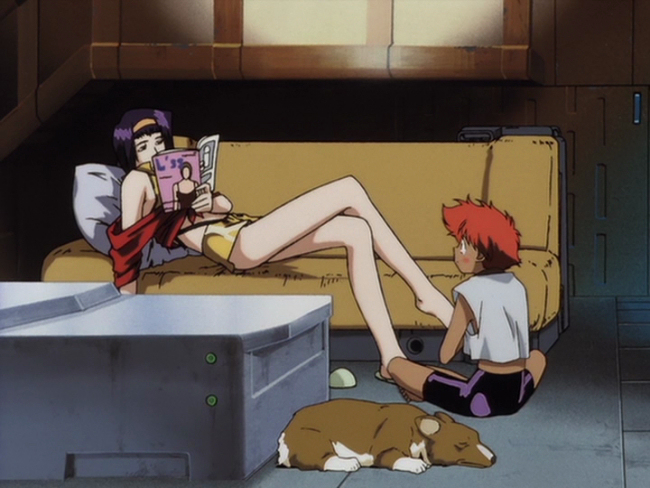
Edward (Aoi Tada) remarks at feeling left out in this episode. Faye tells her she'll tell her about it when she's older. Of course Edward can't participate in this episode, this is a song of experience, Edward hasn't had time to build up the conflicting layers and periods of identity that form the focus of "Jupiter Jazz".
...
This entry is part of a series of entries I’m writing on Cowboy Bebop for its 20th anniversary. I’m reviewing each episode individually. My previous episode reviews can be found here:
Session One
Session Two
Session Three
Session Four
Session Five
Session Six
Session Seven
Session Eight
Session Nine
Session Ten
Session Eleven

No comments:
Post a Comment